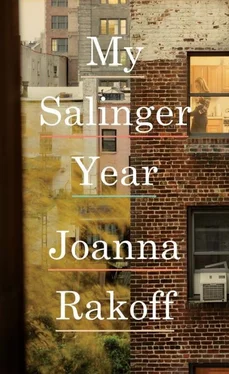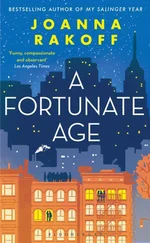As always, I sat too long with this letter, reading it over and over, trying to formulate an appropriate response. There were many war letters. But some—like this one—were so heartfelt, so true, it was—as always—difficult to simply send a form letter back. With this man, I found middle ground: I explained, as gently as I could, that Salinger had asked us not to send on his fan mail, so I couldn’t, unfortunately, pass on his letter. But I told him that under a different set of circumstances Mr. Salinger would have likely been very glad to read his letter and particularly glad to hear that Catcher had played some small part in his recovery following the war. As he knew, Mr. Salinger himself had suffered considerably during the war. He, too, had held friends in his arms as they shuddered through their last breaths. Warmest regards, Joanna Rakoff.
Quickly, as if ripping off a Band-Aid, I typed up an envelope, folded the letter, and placed it inside, then grabbed another letter. No , I thought, you can’t go around revealing your goddam emotions to the world .
Don was not, he said, nervous about James’s verdict on his novel. He was not, he said, anxiously waiting to hear back. “James is not the only agent in the world,” he told me, laughing, as he so often did whenever we discussed anything even vaguely serious. “If he turns it down, then it just wasn’t for him. I can find someone else.”
And yet he still sat, at night, reading over the novel again and again, grimacing at this word or that, as if an imperfect modifier would make or break the whole venture. He was training a couple of nights per week now, and he came home, lugging his bag of gear, in a manic state of exhaustion. Even punching an enormous vinyl bag—or a reedy Puerto Rican kid—couldn’t calm him down. Marc’s wedding, too, was bothering him. Until now, it had been an abstraction, an idea, rather than an actual event that would transpire at some point in the space-time continuum, though I wasn’t exactly sure when. Don would not be the best man—Marc’s brother would play that role—but Marc had asked him to read a poem. Don was scouring our various anthologies, looking for something appropriate. “What kind of poem do you read when your friend marries someone completely boring and wrong for him?” he asked me, laughing.
“I don’t know,” I told him, “but maybe I could use it at Jenny’s wedding.” As far as I knew, I was to be a bridesmaid at Jenny’s wedding, alongside her two best friends from college.
One Saturday night, as the skies ominously clouded over, Don and I dressed—Don silently, desultorily—and took the L a few stops to Marc’s loft on Fourteenth Street for a party. The idea was a sort of pre-wedding blowout, but this being August in New York, no one was around. We found the loft populated with a few Marc-like guys—muscular, clad in Carhartts and Red Wing boots, self-consciously blue-collar gear, completely inappropriate for the weather—drinking beer out of bottles and nodding uncomfortably at each other.
Marc was leaning on the kitchen counter, talking to Allison, whom I’d not expected to see. Her parents kept a summerhouse on the Vineyard and she spent weekends there, though she had no shortage of invitations to Sag Harbor and Woodstock and various parts of Connecticut, the houses of her high school friends, alums of various uptown private schools, their lives funded by never-mentioned trust funds. Lately, she’d become my friend as much as—more than—Don’s. We met for dinner and coffee; we lolled on the couch in her tiny studio; we ventured to the cheap Russian salon down the street to have our nails painted a deep, blackish maroon, then stared at our transformed hands, at glamorous odds with our jeans and T-shirts, our scuffed boots.
“I’m so glad you’re here,” I cried, throwing an arm around her. And I was. My life, lately, had narrowed to Don and work. Where had all my friends gone? They had receded from my life, as Don had advanced. Before I’d moved to New York, it seemed as though everyone was there, playing cockroaches in experimental plays, or making broody films at Columbia, or working at galleries, or teaching dance to the poor kids in Brownsville or the rich kids at St. Ann’s. When I first returned, there had been parties and dinners and coffees and shopping trips—joyous cries of “You’re back”—but now everyone seemed so busy, so involved with the minutiae of their own lives. And then: I had allowed myself to be subsumed by Don.
“I couldn’t miss the pre-wedding party,” she said with a roll of her dark eyes. According to Don, she’d long been in love with Marc, since undergrad, and I wondered now if this were true. She’d never mentioned it to me, certainly; yes, she avoided talking about the wedding, and about Lisa—whose charms, like Don, she found nonexistent, or at least unequal to Marc’s, though she regarded the discrepancy with cool remove rather than vitriol. Now she seemed nervous, tense, irritable. Rather like Don. Suddenly I wished I’d stayed home.
“You ready for the big day?” Don asked Marc, patting him on the back. He was trying for cheer, for bonhomie, which gave him the aspect of an actor in a community theater production of Our Town .
“I don’t know,” said Marc, with an enormous smile. When he smiled, he seemed to radiate pure waves of goodwill and genuine happiness. This was, I supposed, the difference between Marc and Don: Marc was fully at home in the world, content with his life. He needed, he wanted, nothing more than what he had. Don wanted everything, everyone; Don wanted and wanted. “I guess I’d better be ready, right?”
“When is the wedding?” I asked. Allison raised an eyebrow at me. Marc’s smile decreased slightly in wattage, and he looked at me strangely. Then he looked at Don, whose face had gone slack, blank. “Is it Columbus Day weekend? Or am I making that up?”
Marc had stopped smiling and was now glaring at Don. He took a swig of beer before replying. “It’s next weekend,” he said. “Next weekend. On Fisher Island. You take the ferry. You—” He threw up his hands, beer sloshing in his bottle, and smiled again, this time wildly and without warmth. “Don,” he said. “Did you make your reservation for the ferry? You’re supposed to be there on Friday, for the rehearsal dinner.”
Next weekend? I thought. How was it possible that I’d not known this? That I knew none of the details, nothing. My boyfriend’s best friend’s wedding. Fisher Island. I wasn’t even sure where that was. I’d thought the wedding would be held in Hartford, at Marc’s parents’ house, that we’d take the train, stay with Don’s family. Why had I thought this? Next weekend .
Mentally, I began—vestiges of my mother—going through my closet, wondering what I’d wear not just to the wedding but to the rehearsal dinner.
“Yeah, yeah, of course,” Don was saying. “Let’s talk about it later.” Where would we be staying? I wondered. A hotel? Had Don made reservations? Or were we being put up by friends? By Marc’s family?
Just then Olivia arrived—I had invited her, in part so that I’d have someone to talk to—accompanied by a slender, bespectacled man in khakis and a polo shirt, looking very ill at ease. “This is Chris,” she said. She’d told me, on the phone, that she had a new boyfriend, he did something at a bank, something involving computers, algorithms. Her previous boyfriend had been a painter, like Olivia, and this guy’s exact opposite: tall and athletic, so classically handsome it was almost comical.
“Nice to meet you,” I said, reaching over to shake his hand. They had met, it seemed, on a blind date.
The door to Marc’s bedroom opened, and Lisa—Marc’s fiancée—emerged, clad in loose jeans and a gray T-shirt, her hair pulled back in a ponytail. It suddenly occurred to me that she must live here, too. That perhaps she had lived here all this time—the whole time I’d known Don, through all the parties we’d attended, the times we’d stopped by for a drink on our way somewhere else—but Don had refused to acknowledge this. He referred to the place as “Marc’s loft.” And I did, too. Always. Marc’s loft. How long had Marc and Lisa been dating? Likely years. Marc’s loft . From across the room, I watched Don greet Lisa with a forced smile.
Читать дальше












